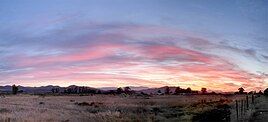Ashton, South Africa
Appearance
(Redirected from Ashton, Western Cape)
Ashton | |
|---|---|
Clockwise from top: Sunset over Ashton, Ashton Railway sign, Ashton Train Station. | |
| Coordinates: 33°50′5″S 20°3′17″E / 33.83472°S 20.05472°E | |
| Country | South Africa |
| Province | Western Cape |
| District | Cape Winelands |
| Municipality | Langeberg |
| Area | |
• Total | 23.5 km2 (9.1 sq mi) |
| Population (2011)[1] | |
• Total | 13,325 |
| • Density | 570/km2 (1,500/sq mi) |
| Racial makeup (2011) | |
| • Black African | 40.9% |
| • Coloured | 53.4% |
| • Indian/Asian | 0.2% |
| • White | 5.0% |
| • Other | 0.4% |
| First languages (2011) | |
| • Afrikaans | 58.6% |
| • Xhosa | 35.7% |
| • English | 1.4% |
| • Sotho | 1.3% |
| • Other | 2.9% |
| Time zone | UTC+2 (SAST) |
| Postal code (street) | 6715 |
| PO box | 6715 |
| Area code | 023 |
Ashton is a small town in the Western Cape in South Africa. The town is at the foot of the Langeberg mountain range, 10 km southwest of Montagu and 19 km east-southeast of Robertson. It is situated in a valley known for production of wines and fruit.[citation needed]
Ashton is known for its canning factory, which has faced economic challenges in recent years.[2] Ashton is also home to various tourist attractions, including vineyards and the Ashton Steam Locomotive.[3]
History
[edit]It was established in 1897 on the Roodewal farm and attained municipal status in January 1956. The town was named after the first station-master.[4]
References
[edit]Wikimedia Commons has media related to Ashton, Western Cape.
- ^ a b c d Sum of the Main Places Zolani and Ashton from Census 2011.
- ^ Villette, Francesca (25 January 2024). "Seasonal contracts are cold comfort for retrenched workers at canned fruit factory". IOL. Retrieved 2 June 2024.
- ^ "More about Ashton Steam Locomotive". LekkeSlaap. Retrieved 6 December 2024.
- ^ "Dictionary of Southern African Place Names (Public Domain)". Human Science Research Council. p. 63.






